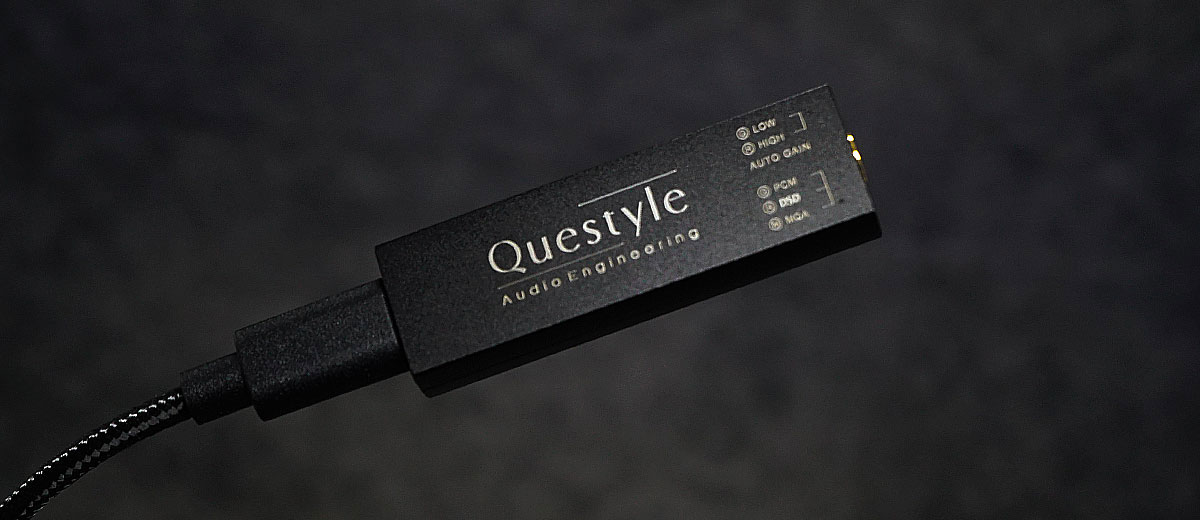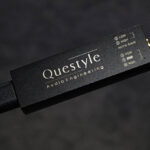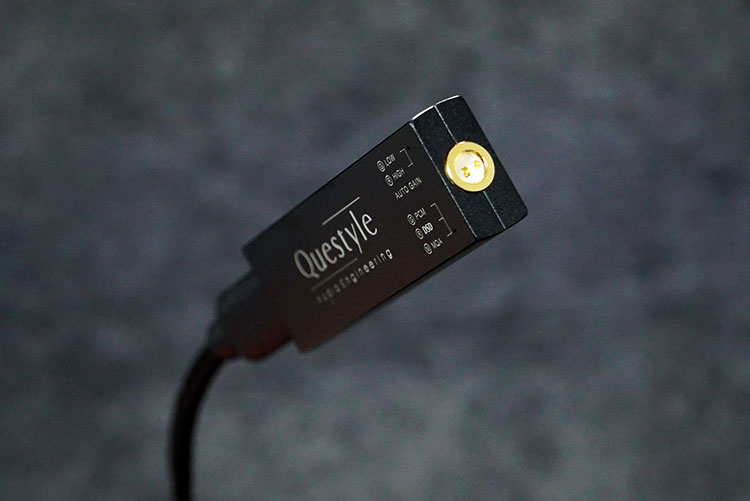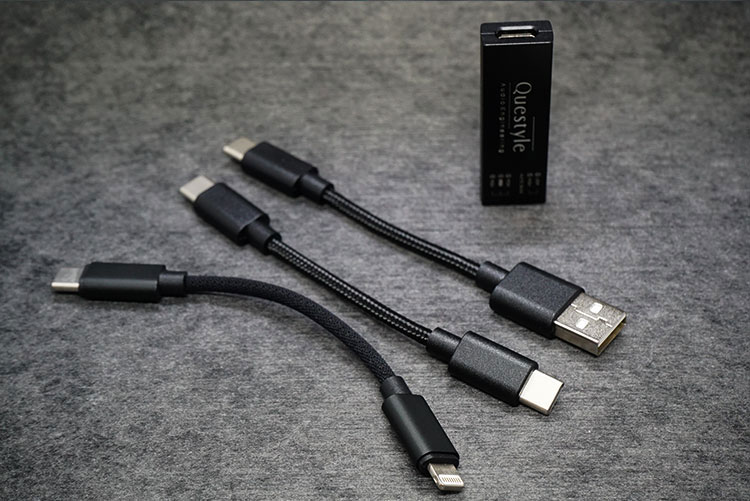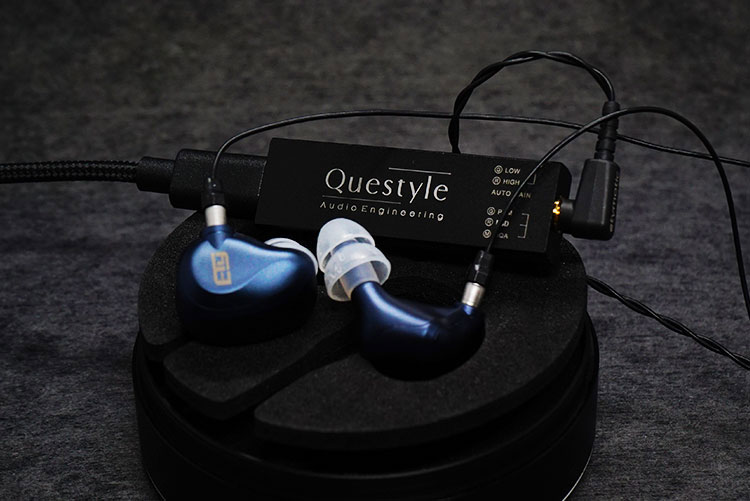Questyle M12 is a dongle-style integrated DAC and amplifier featuring the company’s Current Mode Amplification technology. It is priced at $139.99.
Disclaimer: The Questyle M12 that was sent to us is a sample in exchange for our honest opinion. We thank Questyle for their support and for giving us this opportunity.
To read other Questyle products reviewed on Headfonics click here.
Note, this 2-page review follows our new scoring guidelines for 2021 which you can read up on here.
Many manufacturers have crossed swords in dongle combat ever since Apple ditched the phone jack a few years ago. Brands such as Cayin and Luxury & Precision have all complimented their DAP products with recently or soon-to-be-launched high-end dongles such as the PAW S1 and the W2.
Questyle, a designer of DAPs and desktop units, has also decided that the time is right to join the fray with their own high-performance DAC and amplifier dongle called the “M12”.
The pricing is jaw-droppingly low for a Questyle device and it comes with a new iteration of their Current Mode technology, as well as the versatile ES9281AC Sabre DAC that decodes MQA natively.
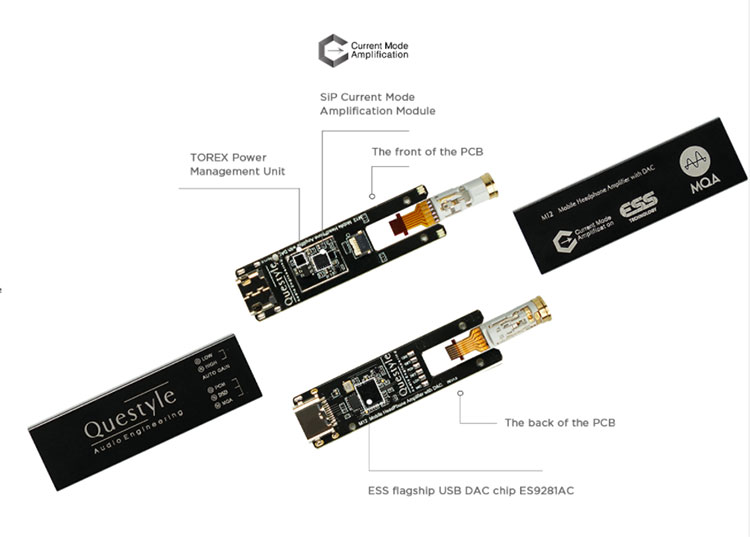
Tech Highlights
The M12 is an official collaboration product based on ES9281AC decoding solution featuring ESS HyperStream II QUAD DAC architecture, Time Domain Jitter Eliminator, and hardware MQA decoding.
Inside the small bar, Questyle has implemented a new SiP Current Mode Amplifier module with a TOREX power control module.
The technology has a built-in smart detection system or an impedance response mechanism that allows the M12 to automatically match the load it detects on the output, thus optimizing the dynamics.
Design
The housing is CNC machined and anodized from aluminum blocks, a clean and modern sandblast finish is then applied to achieve a semigloss appearance with fine texture.
It feels smooth and premium to the touch and the screw-less design is clean and effective. The M12 is available in “Classic Black” and “Stylish Silver”, meaning you can opt for stealthy or pick the brand’s signature silver color.
We are sent the “Classic Black” styled M12 and the vintaged yellow fonts imprinted are lovely, aligning well with the design reminding me of QPM‘s palette. The lightweight design is perfect for day-to-day use and on the palm, it feels lighter than a small pack of gums.
If you think Questyle hasn’t put in enough design effort, looking inside you will see a soft PCB connecting the 3.5mm jack and the mainboard. This is a good practice that will make sure the force exerted on the plugs is not relayed to the board, sometimes surface-mounted plugs can break if you accidentally stress the connection.
I/O
The design has no toggles on the casing, the only connectors exposed are the USB-C socket and 3.5mm Jack, which keeps the design clean and dedicated to 3.5mm SE outputs.
The connection is solid and once plugged in the cables you won’t feel anything moving or contact failing, nor any scary sudden pops. When unplugged on the output’s end, the power on the unit will automatically go off.
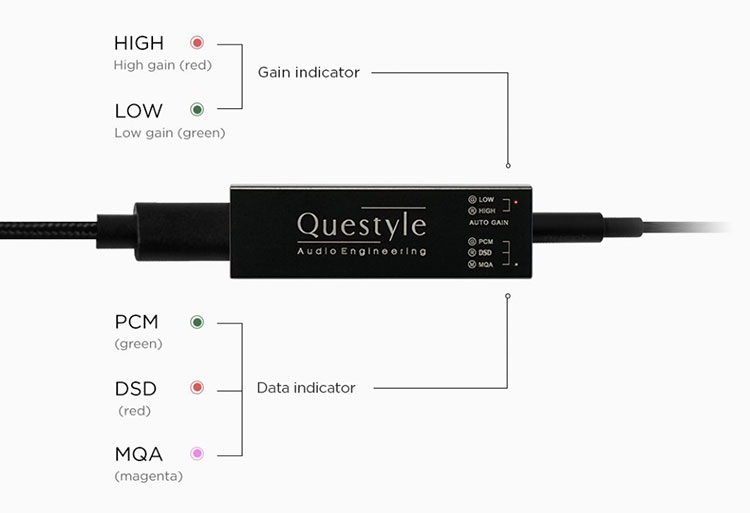
Controls
There are no physical buttons so the host device will take care of the volume control. The gain is automatically triggered and there is no manual way to adjust, you will need the load sensing detector inside to do the matching and the status is shown by the LEDs.
Gain display
- High gain – red
- Low gain – green
Codec display
- PCM – green
- DSD – red
- MQA – pink
Packaging & Accessories
The M12 comes in a fairly basic paper packaging with the brand’s logo on top. Taking a look at the right side of the box you will find a small satin fabric handle sticking out, pull It out then you will see the M12 under the pile of user manual booklets.
Digging deeper down, the USB-C to USB-A and the USB-C to USB-C cable are lodged. You can see from the metallic parts and the sheathings these cables are ready for some heavy-duty.
Questyle explained that the cables have an aluminum foil layer inside for enhanced shielding from EMF and from actual use seldom will it pick up any interference unless a call comes in.
Internal Hardware
The Questyle M12 packs in the potent DAC chips ES9218AC and patented SiP amplification technology. This involves discreet components and triodes for signal amplification, seemingly a concise version to their Class A designs such as CMA800, QPM, etc.
The proprietary SiP module is exactly what gives the upper hand to Questyle and differentiates it from other rivals, freeing it from the constraints of opamps and empowering the output with superior current output power for higher dynamic range as well as a natural timbre.
The ES9281AC DAC supports up to DSD256 (1Bit 11.2MHz), 32/384 decoding with SABRE32 technology. To keep you busy streaming high-resolution tracks on Tidal there is a hardware MQA renderer that will automatically stream lock and unfold decoded MQA stream.
Performance Numbers
The SiP amplification module offers high current output, and the THD+N is recorded to be 0.0003%, even lower than the QPM.
With a 16Ω load, the output maxes out at 46.11mW, on 32Ω it is getting 26.71mW with the lowest distortion level measured and a 300Ω load will get you 12.26mW output. We can see it is optimized for sensitive earphones such as multi-BA or sensitive Dynamic IEMs around 16Ω.
Wired Connectivity
USB-DAC
Connecting to my MacBook pro and browsing on YouTube there is no latency detected and the connection is fast without any issue. It requires no driver for Win 10 18.3 or above. With Mac laptops or an iMac, it is plug and play, you can enjoy the device out of the box straight away too.
USB-OTG
With a USB-C connection, the M12 plays right away with Android 5.1 or newer Android platforms. For iPhone users you will need to purchase the lightning cable, the cable is slightly stiff but adds to the durability. Connection is seamless with little to no latency on music games.
When a call comes in the cable or the unit may pick up a little bit of noise but it is relatively quiet if you intend to stick the M12 on the back of the phone.
Sound Impressions
Summary
Finesse in shaping dynamic, detailed, and resolving sound as well as vibrant, energized tuning is always the key strength of Questyle products.
With their expertise in designing amplifying instruments for demanding high-end headphones, it seems like they have found a way to work around portable power constraints and deliver some of these distinctive qualities.
From the official data, the output isn’t very high but putting the M12 to actual test proves that the M12 is capable of extracting plenty of bass power, clarity, and texture. This small dongle is working decently especially with sensitive multi-BAs that need delicate control and fine-tuning than just sheer power.
With MQA streamed on my phone I am experiencing a full-bodied, soothing midrange that does not compromise speed and extension when paired with the M12.
The intimate, smooth vocal delivery is addictive. If you think the highly resolving gears take away the sweetness on your K/Jpop or the groove in your 70’s tracks, then the colorings on M12 may put a smile on you.
Bass
The sub-bass on the M12 doesn’t stand out much but the bass does extend very well sub-50Hz where you can still hear the lower strings bass fundamental even in higher pitching instruments. Conversely, more of the mid-bass frequencies come through and render the tone with a good hint of warmth.
With most IEMs the bass is very smooth and moderately dense. The decay has great control, elaborated almost but not lacking in speed with drum works sounding airy and expansive. The tuning is also exceptionally smooth with double bass plucks that sound beefy and beautiful in their overtones.
Bass guitar plucks and slaps are also easily picked up and sustained well in the background. Though it may not be as clearly outlined as the higher-end dongles especially when you focus on the picking and density, the tuning is immersive. The M12 is not shy to express the emotions and the intrinsic power of the music.
Mids
The lower-end goodness extends to the midrange frequencies which is the focal point of the soundscape rendered. Vocal is intimate, lush, and free from compression, very enjoyable with music I typically stream like current pop standards and some old JPop.
While being rich and pronounced in the mid-lows the vocal sounds are unmasked and are extremely smooth in articulation. This works very well with multi-BAs balancing fast bass response and textured treble, adding depth and dimension to the vocal.
Treble
Beyond the upper mids, you can hear the 5-7kHz harmonics range being clear and the sibilance range being rounded off, this promises good openness and loudness in the vocal range while not being shouty.
While there is limited power in the output hoarse voices may miss their edges and it favors both male and female vocalists that sing light, for instance, some tunes from Cigarettes After Sex sound overly euphonic.
Arguably the M12 treble may sound less resolving or missing the tension for the first few minutes of listening. However, going beyond the first or second track you will feel the tuning growing on you. More details are revealed once your ears get used to the tuning and it is not tiresome at all for long listens.
Soundstage
Staging is not exaggerated with the M12, quite natural to the ears but it may get slightly overflowing when more instruments set in. This is not built to handle big orchestras, though chamber music and smaller gigs work like a charm with its stereophonic stage rendered.
The vocal image and has a good sense of depth and is strongly weighted, same for acoustic guitar which stands out and has a rather big image radiating from the foreground.
Click on page 2 below for pairings and select comparisons

